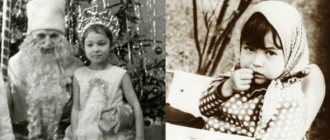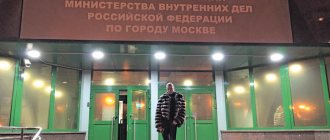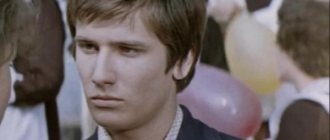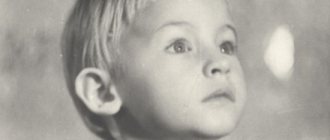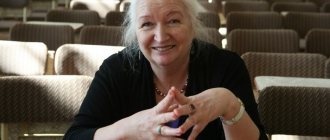Biography of Victoria Tarasova
Victoria Tarasova is the star of the series “Capercaillie”, “Karpov” and “Pyatnitsky”, who embodied on the screen the image of a strong and independent woman, a single mother who is no stranger to coping with life’s difficulties alone. Like her heroine Irina Zimina from “Capercaillie,” Victoria had to endure many trials, which she overcame with dignity, while managing not to betray her loved ones and remaining herself.
In the photo: Victoria Tarasova
Films with Aglaya Tarasova
In 2012, the film “After School” was released. In this project, Aglaya got only a cameo role. The Presnyakov brothers were the scriptwriters and directors of the project. They liked Tarasova’s performance so much that they again invited her to their new film.
In 2013, the young actress went to the casting for the TV series “Interns.” The girl's candidacy was approved. And the niece of the head of the venereology department, Ivan Kupitman, appeared on the country’s screens. Sofya Kalinina, although she was enrolled in Bykov’s internship through connections. But later it becomes clear to the viewer that she is a qualified doctor. Throughout her entire screen time, Sophia tries to prove to herself and those around her that she is an independent person, despite her rich parents. In her early years, when the profession of an actress was not yet a priority for Tarasova, she jokingly told her friends about the series “Interns” that this was the only series in which she would star. If she were an actress, of course. “Major Sokolov’s Heteras” in 2014 showed Aglaya in a new genre of “military drama” for her. And in 2020, the actress played a role in the project “Investigator Tikhonov.”
On February 14, 2020, the sports drama “Ice” was released on screens across the country. Aglaya played the main role of a figure skater. The film shows the heroine’s journey, which she overcame after an injury and got back on the ice. The painting became the girl’s first big work. During the filming process, Tarasova’s mother was next to her. This painting was the first collaboration between mother and daughter. Initially, Aglaya didn’t even want to go to the casting for this film. She couldn't imagine a figure skater with the figure she had. But the creators of the film liked the fragile girl. For confidence on the ice, the actress was sent to accelerated training for 4 months. According to the psychological immersion program, the actress got used to the image of an injured athlete. I spent a lot of time communicating with a girl who experienced a similar trauma. The actress was so inspired by the story that she performed some of the stunts herself. Aglaya decided to perform the scene with the fall on the ice on her own.
In many of her interviews, the young star says that she is very upset by what many ill-wishers call her. The status of “Rappoport’s daughter” is very offensive for the girl. But the offense is not so much for myself, but for my mother. After all, even if she asked her mother for support in promoting her acting career, Ksenia would not participate in this. Along the way, help with advice or give a couple of lessons, yes. But pushing your daughter into projects is not about Rappoport. Aglaya herself has been planning to fill the gaps in her education for quite some time by enrolling in theater. But life circumstances still insist on a different development of events, and the girl does not argue.
Childhood
The small homeland of Victoria Yuryevna Tarasova is the small ancient city of Skopin in the Ryazan region, according to one version, it received its name from the old Russian name for birds of prey. Here Victoria was born on July 16, 1971, but she spent her childhood and teenage years in Smolensk, where her father received a position as a dance teacher at the Palace of Pioneers.
Victoria Tarasova in childhood
Vika’s father, Yuri Tarasov, was a pop dancer in his youth, later he was a choreographer for a military ensemble, and the mother of the future actress, Nadezhda Kudelinskaya, also belonged to the creative intelligentsia; she is a theater director by profession. Victoria grew up with her sister Marina, who is seven years older than her. In an interview, the star of the series says that she inherited from her father a love and ability to dance and was already tap dancing at the age of five.
After graduating from school in 1988, Victoria, unexpectedly for her family, decided not to connect her life with dancing, as she had previously planned, but to enter GITIS. Alas, during the entrance examinations the girl could not withstand the nervous tension: while reading a monologue, she burst into tears right in front of the members of the examination committee and, of course, failed the exam. Not accustomed to retreat, she went to the Cherkasov Leningrad Institute, but failed there too.
Returning to Smolensk, Vika Tarasova taught the art of dance for a year at the Palace of Pioneers, where her father worked, and in 1990 she entered the famous “Shchepka”.
Victoria Tarasova as a student (1992)
Victoria has always been distinguished by her integrity, which was the reason for her conflict with her French teacher. Because of this, in 1993 Victoria transferred to RATI, where she was finally able to complete her acting education. The young actress’s mentor while studying at the Academy was Pavel Osipovich Chomsky.
Carier start
For a year and a half, the actress worked on television - she was the host of the “6 Sotok” program, but her main income came from filming advertising videos, although, according to the actress, she was very rarely offered work in advertising. Victoria Tarasova - presenter of “6 Sotok” Victoria’s film debut was the role of a poacher’s wife in the 1994 dramatic film, directed by Agasi Babayan, “The Lynx is on the Trail.” The partner of the aspiring actress was Stepan Starchikov, who played the role of the heroic huntsman Losev; Viktor Neznanov and Tatyana Tashkova also played in the film.
Young Victoria Tarasova in the film “The Lynx is on the Trail”
In 2004, Victoria starred in an episode of the detective television project “Kulagin and Partners”, and the following year she played a small but rather bright role in the ironic mini-series “Demon in the Rib, or the Magnificent Four”, in which she collaborated with famous actors - Ivar Kalnins , Boris Smolkin and Dmitry Nazarov. Also, the initial stage of Victoria’s career includes work in the multi-part projects “Alibi Agency”, “Silent Witness”, “Matchmaker” and “Trace”.
Victoria Tarasova on the stage of the theater
In 1997, the young actress entered the Jewish theater "Shalom". According to Victoria, chance brought her to the famous theater. Having come to a performance in which her friends were playing, she received an offer from Alexander Levenbuk, the artistic director of the theater, who invited her to replace the actress who had gone on sick leave.
general information
Ekaterina Tarasova is a film and theater actress. The native Panfilov’s track record includes 18 cinematic works. You can meet her characters in the series “Kuprin. In the Dark", "Scouts", "Mayakovsky. Two days". Ekaterina made her film debut in the multi-part television project “Dostoevsky” in 2010. He appears in films of the following genres: biography, comedy, western, detective, drama. On camera she interacted with the actors: Dmitry Sutyrin, Pyotr Zhuravlev, Nadezhda Tolubeeva, Andrey Polishchuk, Oleg Zhilin and others.
According to the zodiac sign, Ekaterina Vladimirovna is Leo. Photos of Ekaterina Tarasova and facts from her creative biography are posted below.
"Capercaillie"
The role of police major Irina Zimina became Victoria’s lucky ticket to the hearts of Russian television viewers. The social comedy series, which tells about the everyday life of law enforcement officers, has taken its rightful place in the filmography of Maxim Averin, who played the role of investigator Glukharev. For Denis Rozhkov, who played a typical traffic police inspector, as well as for Victoria, the project became the beginning of great popularity; Marina Boltneva, Vladimir Feklenko and Vladislav Kotlyarsky also starred in the series.
Victoria Tarasova as Irina Zimina
Critics noted that there had never been series like the provocative “Capercaillie” in the Russian cultural space before. Despite some chaos, a small budget and the obvious theatricality of the narrative, the project influenced the viewer with an abundance of psychological nuances, the unpredictability of the plot and the voluminously written characters of both the main and secondary characters.
The cast of the series "Capercaillie"
The heroine of Victoria Tarasova is Irina Zimina, a strict, strong-willed woman who proves over and over again that the concept of the “weaker sex” is not applicable to law enforcement officers. The only weakness that Irina allows herself during the series is her love affair with the hero of Maxim Averin. In the period from 2008 to 2014, Tarasova played the role of a servant of the law in three seasons of the provocative social-comedy series "Capercaillie" ("Capercaillie in the cinema", "Capercaillie: New Again!", etc.), in several full-length films dedicated to the adventures of his heroes, as well as in the series “Karpov” and “Pyatnitsky”, which became a continuation of “Capercaillie”.
On the set of the series “Pyatnitsky”
In an interview, the actress said that she was glad to star in the role of Irina Zimina and rightly considers this role her main film achievement. She maintained warm friendly relations with the actors with whom fate brought her together while working on the Capercaillie project, but with actress Victoria Gerasimova she is still, in her own words, in a state of brutal war. Pyatnitsky. Irina Zimina. The best It is not known exactly what exactly the two actresses did not share, but fans of the series are happy to follow their battles on social networks. According to Tarasova, the conflict with Gerasimova began with the fact that they were forced to share the same dressing room. Tarasova simply found it difficult to get along with her talkative colleague. Then the writers of the series, at the request of the producers, tired of Gerasimova’s constant demands for an increase in fees, removed her heroine from the plot, “killing” her with the hands of Zimina. Enraged, Gerasimova blamed Victoria for everything. Filming for the season ended in a tense atmosphere.
Victoria Tarasova has a difficult relationship with Victoria Gerasimova
But Victoria is on friendly terms with the performer of the role in “Karpov” Vladislav Kotlyarsky. The actress was impressed by her colleague’s thorough approach. If the action of a new series took place, for example, in a mental hospital, Vladislav went to the appropriate institution and learned all the ins and outs of the life of mental patients. Later, Victoria and Vladislav played spouses together in the enterprise play “I Hate. Zhanna." Sometimes they, as well as the entire cast of Pyatnitsky, get together to sing karaoke.
Victoria Tarasova and Vladislav Kotlyarsky are friends
Personal life of Aglaya Tarasova
On the set of the series “Interns” I met actor Ilya Glinnikov. Along with her popularity, the girl also developed feelings for her filming partner. On the set, the young people became friends, spent a lot of time together, and then feelings flared up. The couple managed to hide their emotions for a year. They, fearing envy and the evil eye, did not demonstrate their relationship in public. Fans learned about their love only at the premiere of the film “Only Girls in Sports,” in which Glinnikov played the main role. The couple appeared in public together, holding hands and publicly showing affection.
In September 2014, information leaked to the press that the couple had separated. They began to come to filming separately and behaved like strangers on set. As a result, they later made peace. The actors posted confirmation of the stormy reconciliation on social networks. After quarrels, photos of kisses were deleted. Then new ones appeared. Thus, the couple diverged and converged about 10 times. The final break in relations occurred in the summer of 2020. After another quarrel, the conflict again moved to the social network for the amusement of fans. Contacts and photos were deleted again. At first, people didn’t even think that the matter had taken a serious turn. They began to worry when enough time had passed, and no new photo reports of reconciliation had appeared. As a result, the star-crossed lovers began to live their own lives.
Glinnikov after the show “The Bachelor” actively developed the theme that he was very upset about the final break with Aglaya. He hinted that he was thinking about suicide. 2020 brought changes to the actress’s personal life. Actor Milos Bikovich was Tarasova’s colleague on the set of the film “Ice.” He played a figure skater who is in love with Aglaya's heroine, Nadezhda. The Serbian actor came to Russia when he had already established himself in the profession in his homeland. Appeared in the films “Spiritless 2”, “Sunstroke”.
As in the first case, the lovers did not immediately begin to advertise their relationship. The couple appeared in public together only when journalists managed to “get wind” of the affair. Aglaya affectionately calls him a Serb in an interview, saying that all their relationships are built on lightness and humor. A piquant detail of meeting my parents was that Milos played the lover of the heroine Ksenia Rappoport in the film “Myths”. Journalists have already attributed an “interesting position” to Aglaya. They began to pay attention to the loose clothes of the actress, in which she appeared at events. But after a year and a half of relationship, the couple broke up. This was officially announced through the social network Instagram. Aglaya stated that they were parting as friends. The reason was the discrepancy between tour and work schedules. Of course, this news dispelled rumors about Tarasova’s possible pregnancy.
The actress celebrated her 24th birthday with her celebrity friends. The Vernik brothers, Irina Starshenbaum, Svetlana Bondarchuk and many others came to congratulate her. Nearby, of course, was her mother Ksenia Rappoport. But the ex-lover, with whom he remained on warm and friendly terms, was not at the celebration. At the premiere of the film “Coach,” where the girl came alone, everyone was amazed by her revealing outfit. Critics on the Internet have slammed Aglaya's emphasis on her legs. In the comments to the photographs from the premiere one could find many dissatisfied with Tarasova’s choice. Someone suggested that she was thus trying to win Milos back, others that the girl was demonstrating readiness for a new relationship. As a result, the jacket dress fulfilled its function and attracted attention to the star, although at this event many stars distinguished themselves with an unsuccessful choice of outfits.
Other projects
In 2014, Victoria played one of the main roles in the melodramatic series “Against All Odds,” appearing before the audience as the wife of the hero Alexander Tyutin. Tarasova’s company on the set of this series included Maria Baeva, Ivan Nikolaev and Evgeny Nikitin. Fans of the actress, of course, enthusiastically accepted her new work, however, noting the mediocrity of the project. Victoria Tarasova. My hero In the same year, Victoria Tarasova appeared in the role of a mother fighting for the love of her son, whose right to custody she lost while staying in places not so remote. In the touching crime melodrama “Mother in Law,” the actress starred in the company of Andrei Chernyshov, Roman Ageev and Igor Artashonov. Unlike the previous project, both viewers and critics appreciated the subtle and complex work of Tarasova, who managed to move away from the image of Irina Zimina and play the role of a desperate woman, but capable of anything for the sake of the happiness of her child.
Still from the TV series “Mother in Law”
In the summer of 2014, the pilot episode of the comedy project “Cable” was posted on YouTube. Together with Victoria, other stars of the series “Capercaillie” took part in the filming. Despite the fact that the first episode of the satirical film, ridiculing the realities of modern media culture, was liked by the audience, the next episodes were not published. Cable. Fragment In 2020, Victoria starred in an episode of the comedy series “Policeman from Rublyovka,” but the actress’s name was not even listed in the credits. The main roles in the television project beloved by many Russians were played by Alexander Petrov and Sergei Burunov.
“Policeman from Rublyovka”: Victoria Tarasova and Alexander Petrov
In the exciting multi-part crime drama of 2016 “The Traitor,” which later became known as “One Against All,” Victoria became the partner of Mikhail Porechenkov, Sergei Cherdantsev and Ilya Shakunov. The crime project of the NTV channel impressed viewers with the trademark rapid development of the plot and the brilliant, well-coordinated performance of the actors, among whom the work of Victoria Tarasova, who played the head of the investigation department of the Internal Affairs Directorate of a small provincial town, stood out.
Victoria Tarasova and Mikhail Porechenkov
The actress said that she agreed to participate in the project, despite being tired and busy with work. According to Victoria, having learned that she would have to meet Mikhail Porechenkov on the set, she simply could not refuse.
Personal life of Victoria Tarasova
Victoria's first lover was a young man named Slava, about whom we only know that he was seven years older than the actress.
Tarasova's first marriage did not last long. Victoria left her husband after finding him in bed with his friend Julia. The actress’s second marriage also cannot be called successful. After graduating from the academy, Tarasova lived in a civil marriage with a Moscow businessman, the owner of a large enterprise, Mikhail Gumen, from whom she gave birth to a son, Danila, in 1998.
Victoria Tarasova and Mikhail Gumen
During pregnancy, Victoria and Mikhail decided to get married, but the matter did not reach the registry office. During the next quarrel, Mikhail uttered words that the actress could not forgive him: “Fuck you with your child!” This happened literally on the eve of giving birth. The boy's birth was difficult, and Mikhail did not even visit his child's mother in the hospital. This was the end of their relationship. At discharge, Victoria was met by her parents. They quit their jobs in Smolensk and moved to Moscow to be closer to their daughter and newborn grandson.
Victoria Tarasova and Danila Gumen
Victoria did not interfere with Danila’s communication with his father and his younger half-sister Daria (born 2003), a professional snowboarder who passed away in 2020 due to illness.
Victoria Tarasova's son is already an adult
Victoria lives with her son in Kuntsevo; she is very proud of the beautiful four-room apartment that she was able to earn for herself. The actress is very grateful to her parents and cousin, who always supported her.
Actress Marina Kudelinskaya is Victoria Tarasova’s cousin
Victoria's older cousin is also an actress - Marina Kudelinskaya, star of the TV series "Interns" and "Cursed Paradise", one of the leading actresses of the Satyricon Theater.
Charity
An important part of Victoria Yuryevna’s life is charity.
The actress often performs in orphanages, boarding schools and hospitals. In 2016, she founded the “Help the Children of the Smolensk Region” foundation, which provides targeted assistance to people in difficult life situations and children left without parents. According to Tarasova, the idea to create a charitable organization came to her after she accidentally met Lena and Maxim Lipaev, who lost their parents and were left alone in the indifferent and cruel world of adults. With the help of her friends, Victoria helped the children who had suffered such a serious ordeal. Victoria Tarasova came to the Gorlovka school. The actress held her first charity evening in the city of Vyazma, and she donated the money raised from the concert to the head of the Vyazma boarding school. It was from this concert that the Foundation’s activities began, which consists of conducting cultural events and leisure programs aimed at supporting, including financially, children experiencing social, medical or other problems. For her activities, Victoria Yuryevna was awarded the Order of the Most Holy Theotokos - Gracious Heaven. The famous actress also performs a lot for military personnel; she gave concerts in Syria and the North Caucasus. Victoria Yuryevna is an active member of the social movement “Donetsk Republic”, which is headed by Denis Pushilin and which aims to create an independent and economically independent, socially oriented state. The actress is also a member of the cultural council of the Federal Service of the National Guard Troops of the Russian Federation, and for her contribution to peace she was awarded several certificates from the Russian Ministry of Internal Affairs.
Victoria Tarasova now
Having become a guest of Lera Kudryavtseva in her author’s show “Secret for a Million” on the NTV channel in September 2020, the actress shared shocking details of her life. Victoria spoke about how she was betrayed by her first husband and abandoned by her second immediately after the birth of their son. Maxim Averin also took part in the show, with whom, according to some sources, the actress had more than just official relations. By the way, both she and Maxim denied this information, calling it rumors. Guests of the show were Victoria’s sister, actress Marina Kudelinskaya, and her close friend, Roman Senin.
Victoria Tarasova and Maxim Averin confirmed that they did not have an affair
. Victoria is proud of her theatrical career, unlike her work in cinema, in the theater she played a wide variety of roles, including many of the main ones. The star of "Capercaillie" calls her main theatrical success the role of Stella in the production of "A Streetcar Named Desire", in which her partner was Alexey Guskov, he played the role of Stanley.
Victoria Tarasova in the play “A Streetcar Named Desire”
Recently, the famous actress has been devoting a lot of time to the social movement “Donetsk Republic”. In 2020, together with actor Alexei Ogurtsov, known for his roles in the television series “Officers”, “The Pack” and “Fraudsters”, she took part in the traditional May event “Candle of Memory”, dedicated to Victory Day, in the solemn event “Father’s Land - dear Donbass,” read the text of the Donetsk Dictation to students of the philological faculty of Donetsk National University.
In September 2020, the famous actress held an event within the walls of the Donetsk National Technical University, during which she discussed with students the topic of a single socio-cultural space of Russia and Donbass. Victoria Yuryevna also spoke about her creative path, favorite roles, charitable activities and humanitarian trips to Syria and the North Caucasus. The meeting with the TV series star was attended by about 100 Donetsk students and young activists of the Young Republic social movement.
A still from the series “Pyatnitsky-4”
In 2020, Victoria Tarasova was involved in the filming of only one project. It is known that in the detective drama “O.K.O” (working title “The Third Eye”) she collaborates with Rina Grishina and Artyom Eshkin, and Marina Kondratyeva and Evgeny Venediktov also star in the film.
Alla Tarasova (Yu. Chirva)
NEWS LIBRARY ENCYCLOPEDIA LINKS ABOUT THE SITEAlla Tarasova
Already during her lifetime, Alla Konstantinovna Tarasova was spoken of as a great actress. She played on the stage of the Moscow Art Theater for more than fifty years, and since the early thirties, almost every new work of hers has been an event in theatrical life. Over many years of activity in the theater, she played dozens of roles. In the movies, her fate was not so happy.
However, how to count... In recent years, we have become accustomed to numbers. And we involuntarily evaluate with numbers even what is not directly related to them. Naturally, with such an assessment, the achievements of older generation actors sometimes fade in the eyes of film lovers. For in them quality clearly exceeded quantity. Some modern actors have never had time to say their word, to acquire real, lasting fame, or even skill, and lo and behold, their track record already includes fifteen to twenty roles. Only none of them was a noticeable phenomenon in artistic life, did not leave such a mark in the minds of the audience when the image created by the actor is depicted for the viewer as the unconditional and even the only possible embodiment of a historical or literary person.
Unconditional and even the only possible! But this is exactly how the screen creations of older generation actors were perceived. Such as N.K. Simonov, M.I. Zharov, N.K. Cherkasov. People like Alla Tarasova.
Alla Konstantinovna Tarasova played less than a dozen roles in films. But three of them entered the golden fund of Soviet art and became classics of the national screen. Three roles played over eleven years, between 1934 and 1945. These years can hardly be compared with anything in terms of the speed of social change, the intensity of emotions, and the intensity of tragedy. And the three big roles in which the actress appeared on screen over the years could not become passable. They have taken too much into themselves.
The problems that fed the content of these roles were great and complex. The images embodied by A. Tarasova were great and significant. Katerina in “The Thunderstorm” (1934), Ekaterina in “Peter the Great” (1937 - 1938), Kruchinina-Otradina in “Guilty Without Guilt” (1944); — in these three images, the actress’s original talent, all the main facets of her artistic individuality, were interestingly and deeply revealed.
The path to the peak achievements of Tarasova’s work in cinema began on the stage of the Moscow Art Theater. From 1917 until the end of her days, she was the leading actress of this theater, an outstanding student of K. S. Stanislavsky and Vl. I. Nemirovich-Danchenko, a remarkable performer of the roles of her contemporaries and the classical repertoire - Elena Talberg in “Days of the Turbins” by M. Bulgakov, Elena in “Fear” by A. Afinogenov, Lisa in “The Winners” by B. Chirskov, Negina and Yulia Tugina in plays Ostrovsky, Nastya in “The Lower Depths” by M. Gorky, Masha in “Three Sisters” by A. Chekhov, Anna Karenina, the Theater has always been a home for Tarasova. But since the early 1920s, her talent periodically attracted the attention of film directors.
Already in 1922, the outstanding German director Robert Wiene, taking advantage of the Art Theater's foreign tour, tried, with the help of its wonderful masters, to make the film “Raskolnikov” based on F. M. Dostoevsky’s novel “Crime and Punishment.” This idea was bold, original and artistically contradictory. The pioneer of expressionism in cinema, the author of the famous “The Cabinet of Doctor Caligari,” Robert Wiene this time sought support for his ideas about the phantasmagoric nature of reality in Dostoevsky’s great novel and built his film as a tragic vision of a man shocked by the spectacle of contemporary civilization.
The world of Dostoevsky in Wiene is a world of modern tragedy, where the despair of the heroes and their unsuccessful attempts to find a way out in the cultivation of evil naturally evokes searches in a different direction among people of high purity and active goodness. This image was embodied on the screen by Tarasova in the role of Dunya Raskolnikova. “Tarasova’s youth and her typical characteristics,” the famous historian and film critic N.M. Iezuitov wrote at one time, “combined with the actress’s direct performance fully corresponded to the image created by Dostoevsky, the image of a slender, strong and self-confident girl who could be patient" and firm, and generous, and calculating. Outwardly, there is nothing spectacular about Duna: a smooth hairstyle with a heavy bun; a black round hat pulled down slightly over the forehead, a simple dress with a white collar - and these are all the external signs of the image. But internally the image is full of great concentration...”
'Storm'
Tarasova's inner concentration of Dunya is an intense, painful search for her thoughts, a constant weighing of two truths on the scales of humanism - truth and justice. It is as if she is sometimes fascinated by the seductive attractiveness of demonism, the peculiar beauty of denial, but in the end another beauty prevails in the girl - human warmth and kindness.
'Storm'
This is exactly how Tarasova played her two most powerful scenes in the film - the fight with Svidrigailov and the farewell to her brother. In the eyes of a young girl, involuntarily forced to be the judge of another person, a huge, complex, ever-changing range of feelings was reflected in all her facial expressions. From noble indignation to confusion and panic. From disgust to sympathy and compassion. Bent over, as if bowing before Svidrigailov’s unexpected generosity, Dunya Tarasova ran out of the room, deeply shocked. And this escape of hers was a salvation not only from a dangerous seducer, but also from herself. Svidrigailov’s act had such a strong effect on her. His strength turned out to be so powerful. Even more dramatic was Dunya’s farewell to her brother. The great tragedy of understanding, condemnation and compassion was read on her face, shown in close-up on the screen.
Tarasova's first experience of working in cinema remained a somewhat exotic episode in her creative biography.
'Storm'
Another, but more everyday than exotic, episode in Tarasova’s work was the shooting of Yu. Zhelyabuzhsky’s film “Who are you?” based on Jack London's novel "The Other Side of the Crack" (1927). Entrusting her with the role of Mary, the director was counting mainly on Tarasova’s excellent appearance and, perhaps, on the fact that the actress, who had returned after the American tour of the Moscow Art Theater, would be able to look like an American on screen. This film, shot in the spirit of the Hollywood models of that time, did not pretend to be anything. Accordingly, in Tarasova’s acting work, nothing went beyond the severity of her appearance, the ability to behave naturally in an unusual driver’s suit, to show efficiency in the strike committee and to always maintain dignity and courage. Only episodes in the actress’s cinematic biography were Vasilisa in the film “Vasilisa’s Victory” (1928) directed by L. Molchanov, where she showed the gradual degeneration to a new life of a “devil woman”, and Natalya in the film “Dreamers” directed by D. Maryan, essentially , repeating Vasilisa. It makes no sense to draw threads from these images to Tarasova’s first big work in cinema. At best, they served as some kind of school of cinema, mastering its specifics.
'Storm'
The birth of Tarasova as a great film actress occurred in 1934 in the film “The Thunderstorm” directed by V. Petrov.
Young Soviet art has come a long way before it learned to reveal the great treasures of the national classics. Along this path we encountered so many pitfalls, so many different means and methods were tested that even simply listing them would lead us astray. But this needs to be mentioned, because every work bears the imprint of time. It is always at war with something, fighting against something, asserting something. For those years, V. M. Petrov’s film was boldly polemical. Creating his “Thunderstorm,” V. M. Petrov argued with the all-powerful tradition of artificially modernizing the classics, its arbitrary reshaping for straightforwardly understood actual purposes, its addition or truncation in the name of clarity and accessibility. Petrov’s “Thunderstorm” was filmed at a time when in Ostrovsky’s play Kuligin alone was usually put forward in the foreground, and the idea of Katerina as a ray in the “dark kingdom” was considered by some to be an idle invention of Dobrolyubov, quite rightly rejected by Pisarev. In addition, the cinema of those years was too keen on genre films, naive and already fruitless debunking of vulgar bourgeois life.
'Peter the First'
Of course, one film could not completely revise long-standing traditions and change all the features of canonical poetics. He was just beginning this revision. But that was its significance. This is where all his fundamental achievements came from, and above all in the image of Katerina.
In the film by V. M. Petrov there are also many rich scenes, emphasized everyday colors, carefully played out everyday details. But here it is justified. The “Dark Kingdom” must be recreated not only in the person of its pillars - Kabanikha and Dikiy - but also in the person of the mass of bourgeois women, drunken men, stupid and thieving clerks. Only in complex correlation with this environment will Katerina’s character be fully revealed, her love for Boris, the inevitability, inevitability and greatness of the emerging tragedy will be understood.
The film begins with the wedding of Katerina and Tikhon. The church is crowded with people. The usual petty-bourgeois gossip, talk about money and dowry. Then a drunken feast, with rude shouts, cruel antics, lustful grins, fights and the inevitable scandal. Both in church and at the table, Katerina Tarasova stands out among others. But at first it seems that this is simply a consequence of her beauty, her position as a bride, and her wedding attire. There is neither special spirituality nor religious exaltation in Katerina Tarasova. She is a young, beautiful, healthy woman, very down to earth, full of life and hidden strength. And only in the bedroom, when the young people are taken to the rooms intended for them, the difference between Katerina and those around her, including her husband, will be revealed.
'Peter the First'
She gives meaning to everything that Katerina Tarasova does, to all her words and actions. Not a single movement of hers is merely a tribute to custom, circumstances, or external conditions. This woman has a wonderful gift of filling everything with living, understandable and dear content. That is why she is so natural both during the wedding, and at the wedding table, and alone with Tikhon. But it is precisely this naturalness, human fullness that ultimately causes Katerina’s clash with the dark kingdom of Kabanikha and the Wild. Katerina Tarasova does not look for conflicts, reasons for quarrels and insults. She is ready to take for granted everything in the way of life of the Kabanov household, which may be at least somehow justified. But at every step she has to encounter hypocrisy, the most cynical deception, the most stupid inertia, the most blatant lies.
With an enlightened face, she tells her husband about how she lived with her mother, how freely and freely her days flowed. She seems to be looking for a sincere response from Tikhon at the most important moment of their beginning life together. But it doesn’t find it and closes and goes out. She seeks contact with Varvara, but her daughter-in-law’s rudeness and cynicism repels her. She is ready to obey Kabanova and endure her reproaches - but they are too unreasonable and rude.
Love for Boris for Katerina is a natural manifestation of her being, a natural consequence of the lack of spirituality and inertia of the “dark kingdom” surrounding her, the only opportunity to fill life with meaning. And at the same time it is a tragedy. It’s a tragedy, because Katerina’s feelings for Boris cannot in any way be justified by the concepts and norms in which she was raised and lives. Thus begins a painful struggle between faith in the legitimacy of the traditional order and an irresistible impulse for a new life. This is how the birth of a person occurs, an individual who is aware of his right to live and love not according to the laws of the “dark kingdom.” Significant deletions in the text, inevitable in any film adaptation, did not give the actress the opportunity to fully play this struggle. But how full, how concentrated the key scenes became.
'Peter the First'
Here is the first date with Boris. The device brings Katerina’s mournful, tormented face closer to us. “Go away, you damned man! Get away from me! - she says passionately and confidently. And after that, he hugs Boris just as passionately. Only in the eyes remains inescapable torment, great confusion. And she hides them on the chest of her beloved, indulging in him with all the melancholy of a mentally lonely person, with all the passion of shared love.
Tarasova also performed the scene of her last date with Boris superbly. She came to Boris’s closet as a last resort. In the entire figure of Tarasova - Katerina, throwing herself into the arms of her lover, in the movements of her hands, her figure, there was so much tenderness, so much love, so much hope. But Katerina noticed the preparations for departure and realized that here she had nothing to rely on. From that moment on, the decision to commit suicide became increasingly stronger in her. From that moment on, her love literally died before our eyes. “Are you going?” — she said bitterly, with tears in her voice, not so much asking as realizing. Then, after a long pause, without any hope, in the voice of a finished man, she said: “Take me with you from here.” And, having received a refusal, she withdrew. In Boris’s words and in his behavior, Katerina Tarasova heard a sentence about her love. And living life left her. The death of the heroine, in essence, already occurred here. The Volga was only the last point.
In Katerina Ostrovsky, Tarasova reached one of her artistic peaks. Rising to the heights of national tragedy. She defined herself as an artist of the theme of the Russian woman, her tragic fate, her path to liberation. Themes of the birth of a personality in a woman, a person who is established in the consciousness of his rights.
A brilliant development of this theme was the image of Catherine in the film by the same V. M. Petrov “Peter the Great”. This film, recognized as one of the outstanding achievements of Soviet cinematography, at the same time caused natural controversy. The ideological inconsistency of his historical concept, the excessive idealization of the image of Peter, the straightforward correlation of the events of a distant era with the reality of the thirties - all this is even more noticeable today than before. The film's historicism bears the all-too-obvious imprint of its era. But, noting these features of the picture, we will also highlight its strengths. Never before has history come so close to the viewer, never become so tangible, embodied in such living, clear, such three-dimensional and carnal figures. Of course, far from historical accuracy, of course, changed and improved, but at the same time how real Peter N. Simonova, Menshikov M. Zharova and Ekaterina A. Tarasova appeared in this film.
'Peter the First'
But if the roles of Peter and Menshikov are somewhat static, then the role of Catherine is full of movement, a complex dialectic of character. From yesterday's cook, a soldier's widow, taken during the storming of Shlisselburg, to Menshikov's mistress and Peter's friend and associate - this is the path in Ekaterina's film. Completely real, historically reliable, this fate in its own way correlated with the fates of many of Tarasova’s contemporaries. And the actress played not so much the exceptional career of the “beautiful girl” from Marienburg, but rather the poetically generalized path of a woman from the bottom, who proved her right and her ability to accomplish great historical deeds soberly, intelligently, and generously.
Just as in “The Thunderstorm,” the script material gave Tarasova only fragments of the complex evolution of the heroine, only loosely interconnected episodes of a tense and at the same time tortuous drama. But she made excellent use of the little that the script gave her.
Here are the first shots of Ekaterina. A soldier's party in a captured fortress. The healthy dragoon Fedka forcefully hugs his captive. For just a few seconds, on the screen, almost completely occupied by Fedka’s large body, a woman’s eyes full of fear and despair appear. And there is so much pain and fervent prayer in them that they attract the attention of even Field Marshal Sheremetev passing through the camp.
Then, in the field marshal’s tent, what was stated with such piercing pain by just one glance of a captive woman seemed to be deciphered. Instead of answering Sheremetev’s questions, Ekaterina cries. And tears are the first nervous release for the unfortunate woman, who a few hours ago lost everything - her husband, family, home and patrons, and is now doomed to cohabit with this old boyar. The appearance of Menshikov for Ekaterina-Tarasova is the best option in these conditions, a happy accident that unexpectedly befell the captive.
From the capture of the fortress to the meeting with Peter, Catherine’s story is generally a concatenation of coincidences. And, a defenseless captive, she submits to every new turn in her fate. A person, a person capable of standing up for herself, freely making her choice, is first revealed in Catherine when she stands up for Menshikov, who is being beaten by Peter. But she declares herself in full voice only at the assembly. All requests are in vain. The plea for protection addressed to Menshikov is in vain. The Governor-General of St. Petersburg, despite all his ranks, remained an orderly and a cunning servant, Menshikov cannot and does not want to contradict the will of Peter. And Catherine goes upstairs with a candle to return back as the Tsar’s mistress. But when Menshikov, who has just violated her feelings, turns to her with a question, she responds by hitting him forcefully in the face. And in this slap in the face, in this angry act, there is a woman’s offended pride, the strength of a formed character, the dignity of a person who has realized himself as an individual.
The entire further evolution of Catherine in the film is the transformation of a mistress into an associate of Peter. Having become an empress, a comrade-in-arms of Peter, Ekaterina Tarasova does not lose a drop of her feminine charm. On the contrary, it seems to be blossoming. And all the features of her human appearance - kindness and spiritual strength, femininity and inflexibility - seem to acquire completeness and completeness. This is how Ekaterina Tarasova appears in the scenes of Alexei’s trial.
'Guilty without guilt'
Tarasova’s last major film work was the role of Kruchinina in V. M. Petrov’s film “Guilty Without Guilt” based on the play by A. I. Ostrovsky. The film was shot during the Great Patriotic War, when the theme of humanism, the central theme of Russian literature, began to speak with particular force. This theme constitutes the main content of the image of Kruchinina performed by Tarasova. Unlike Tarasova’s previous roles, Kruchinina does not know the difficult stages of character development. From the beginning to the end of the film, except for the influxes of several episodes of her youth that appear in Kruchinina’s memories, we see before us a mature person of rare spiritual qualities, kindness and responsiveness. During the harsh war years, it was especially important to show the victory of humanity over all trials. And Tarasova did it with such authenticity, with such perfect skill that her Kruchinina still remains one of the most captivating female images. Her charm is the charm of the high spirituality of goodness. “A person is kind, despite everything he is kind” - this thought gave a special sound, a special shade to every phrase and every gesture of the actress.
Tarasova’s heroines were previously distinguished by their special, emphasized femininity. But it was, as we would say, natural femininity. Both Katerina and Ekaterina are rich not so much in intelligence as in nature, the natural richness of strength and passion. Their human talent comes from nature itself. Therefore, when deciding to take this or that action, expressing a thought, discovering an impulse, they seem to listen to themselves, looking for support and justification for their behavior in that mysterious and not always clear inner work that invariably occurs in them.
'Guilty without guilt'
In Kruchinina, Tarasova for the first time played a woman not only of a natural, spontaneous mind, but also of a harsh school of life. Her Kruchinina does not need to listen to the voice of her own nature. Her life position, her attitude towards others are determined by her entire life path, they are conscious, they are programmatic. The talent of kindness for Tarasova-Kruchinina is the most important human talent. And it is inherent in every person, it just needs support and development. This is exactly how the actress played the scene of the first meeting and first explanation with Neznamov (V. Druzhnikov). Kruchinina Tarasova in this scene is an attentive and intelligent, even wise teacher and kind person. She easily discovers his true essence under the young man’s external rudeness. And easily smashing all the naive, albeit hard-won arguments of her opponent, she clearly shows that she is “both an actress and an extraordinary woman.” This is what her opponent himself will later say about Kruchinina.
If the previous heroines of Tarasova in cinema were somewhat straightforwardly correlated with their time and those features were easily read in them that were a tribute not only to discoveries, but also to the misconceptions of the era, then the image of Kruchinina turned out to be filled with such significant universal human content that it quite naturally took its place next to with the largest images of world art, affirming the idea of good.
The actress once wrote that in cinema she was attracted by the opportunity to use “the artist’s expressive means, the main transmitters of his mood—the eyes and facial expressions” more fully than in the theater. The artistic perfection of Tarasova’s latest work lies in the fact that the depth of her heroine’s experiences, her instant responsiveness to any other person’s pain, her inner spiritual wealth are conveyed by the expression of her eyes, the movement of her eyelashes, and a subtle change in her facial expressions.
Kruchinina remained Tarasova’s favorite creation. Unable to return to this image on the screen, she returned to it again and again on stage, touring with this role throughout the cities of the country until recent years.
Let's end this essay with where it began. We remembered three roles of the great actress. Only three roles. Is it a lot or a little? Probably not enough, if you approach it from the standpoint of the viewer’s interests, from the standpoint of an attentive attitude to the fate of the actress. And a lot, a lot, if assessed from an aesthetic point of view, from the point of view of the achieved artistic result.
Y. Chirwa


